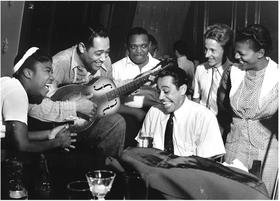Stories of Standards: “It Don’t Mean a Thing” – Duke Ellington
Tune in to Jazz with Victor Cooper – weekdays from 6-9 a.m. MT – for Stories of Standards to hear our favorite versions of this song all week long starting Monday, February 5!
Stories of Standards is sponsored by ListenUp – If you love music, you’ll love ListenUp.
Duke Ellington wrote the melody “It Don’t Mean a Thing” at Chicago’s Lincoln Tavern in August 1931 during intermissions. Irving Mills then wrote the lyrics and the first recording, featuring Ivie Anderson, was released February 2, 1932. This recording was added to the Grammy Hall of Fame in 2008. Ellington attributed the phrase “It don’t mean a thing if it ain’t got that swing” to trumpeter Bubber Miley; Cootie Williams (Miley’s replacement) said it was his catch phrase; Mills said he originated the phrase when explaining to Ellington why customers weren’t dancing. Others may have been using the term at the time as well.
Duke Ellington (1899-1974) was a brilliant composer and pianist, who became one of the best known people in American jazz. He assembled orchestras of virtuoso musicians, wrote arrangements which highlighted their greatest skills and talents and kept them together for many years. He wrote over a thousand songs, three sacred concerts, toured many times in Europe, made hundreds of recordings and received the Presidential Medal of Freedom in 1969 plus a posthumous Pulitzer Prize for Music in 1999.
Irving Mills (1896-1985) led a widely varied life as music publisher, orchestra leader, agent, record company owner, lyricist and vocalist. In 1919 he created a music publishing business which signed previously unknown artists such as Hoagy Carmichael and Dorothy Field. He brought orchestras together, formed a booking company and created a recording company for them. He greatly influenced the careers of Duke Ellington and Cab Calloway, managed the Duke Ellington Orchestra from 1929 to 1939, sang on some recordings and wrote lyrics to several songs including “Mood Indigo” (1931), “It Don’t Mean a Thing (If It Ain’t Got That Swing)” (1932), “Sophisticated Lady” (1933), “Solitude” (1935), and “Caravan” (1937).

9(MDA3NDU1Nzc2MDEzMDUxMzY3MzAwNWEzYQ004))
Become a Member
Join the growing family of people who believe that music is essential to our community. Your donation supports the work we do, the programs you count on, and the events you enjoy.
Download the App
Download KUVO's FREE app today! The KUVO Public Radio App allows you to take KUVO's music and news with you anywhere, anytime!